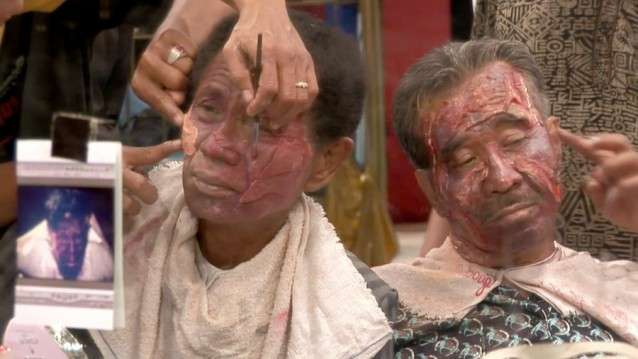 ANWAR CONGO AND HAJI ANIF IN THE ACT OF KILLINGRevisiting mass murder in Indonesia as kitsch pageant and therapy
ANWAR CONGO AND HAJI ANIF IN THE ACT OF KILLINGRevisiting mass murder in Indonesia as kitsch pageant and therapyThe US-born and London-educated Joshua Oppenheimer reveals exceptional rapport with his grizzly subject, the perpetrators of Indonesian mass murders of communists in the mid-Sixties, in his complicatedly self-referential documentary,
The Act of Killing. Culminating a seven-year documentary process, Oppenheimer, who is fluent in Indonesian language, chose to focus on the killers rather than their victims he'd begun by studying, and to draw them into a more revealing place by cooking up a movie about the events for them to both consult on and act in. The creepy experience of watching the mostly unrepentant (and unpunished) gangster death squad bosses ham it up relishing and feebly repenting their youthful exploits as government killers is stunning, but would be more effective if the film were better organized and not so long and repetitive. It's not necessary to be told a dozen times, for instance, that the Indonesian word for "gangster" comes from the phrase "free men"; and seeing mass killer Anwar Congo, essentially the "star" of the show, almost repent three times is not more effective than seeing him do it once, and begins to convince one that he's just playing the role Oppenheimer has set him up for. One also begins to wonder if the horrendous bad taste that pervades most of the scenes is just Indonesian cinema, or owes something to the filmmaker's own lack of distance from the material.
Who is Anwar? When Sukarno was overthrown by Suharto following the tragic 30 September Movement in 1965, Anwar and his friends were promoted from small-time gangsters who sold movie theatre tickets on the black market to death squad leaders. They helped the army kill more than one million alleged communists, ethnic Chinese, and intellectuals in less than a year. As the executioner for the most notorious death squad in his city, Anwar himself killed by his own admission on screen as many as a thousand victims with his own hands. The right wing paramilitary group, Pancasila Youth, that grew out of Anwar's massacre, is prominent today and has government ministers involved in it: the vice president is shown giving a speech touting it and its violence against communists. So here is another appalling thing: the massacres of 1965 are still okay with the Indonesian government and general public. A TV show featuring Answar and his new movie shows this.
The film oscillates between horror and gruesome comedy, especially when it becomes clear Anwar and his cohorts, who apparently started out scalping movie tickets and resented the communists for (Taliban-like?) closing cinemas, are obviously more interested in how sharp they used to look or look now in costume (with prosthetic teeth, died hair, rakish hats) than how culpable they were -- though there's much emphasis on piano-wire garroting, adopted as a "cleaner" (less bloody) way to kill their victims. Some weird connection between the "gangster" identification with "free men" leads to an even weirder and more kitsch outdoor pageant with pretty girls in pink costumes performing the song "Born Free." What a finale! But what does it mean? It all boils down to Anwar Congo's reminiscences. But the restaging of a village massacre, witnessed approvingly by a current government official, is so intense it leaves an old lady stunned, children in tears, and Anwar himself emotionally exhausted. He seems also to identify with his victims to life-changing effect when he plays a scene in which he is the communist interrogated and then killed. It feels as though even in the more honed-down theatrical version of his film, Oppenheimer provides too much undigested and indigestible material for most audiences, though certainly as a record of man's inhumanity and moral blindness, this just about takes the cake.
A key question is whether the official interpretation of Oppenheimer's story arc is valid. Is the fimmaking pocess truly an unexpected emotional journey for Anwar, from arrogance to regret as he begins to act out and thus more directly face the impact of what he did? Or is that just something he puts on as part of the film-within-the-film?
In any case, Oppenheimer has produced a remarkable, if both undigested and indigestible piece of work. Most of it was shot in Medan, North Sumatra, Indonesia between 2005 and 2011. The result was powerful enough to bring Werner Herzog and Errol Morris on board as executive producers after they'd seen preview footage.
The Act of Killing , 115 mins., debuted at Telluride August 2012 and has been shown at other festivals including the Berlinale. Screened for this review at the FSLC/MoMA series New Directors/New Films, March 2013. Both the theatrical version and the 158-minute director’s cut of the film will be screened at ND/NF, but only the theatrical version was watched for this review. A Drafthouse Films release. Limited US theatrical release (NYC) was July 19, 2013. The Metacritc rating is high: 88. I don't quite agree, but fans of documentary or of contemporary Indonesian history will have to see it.





